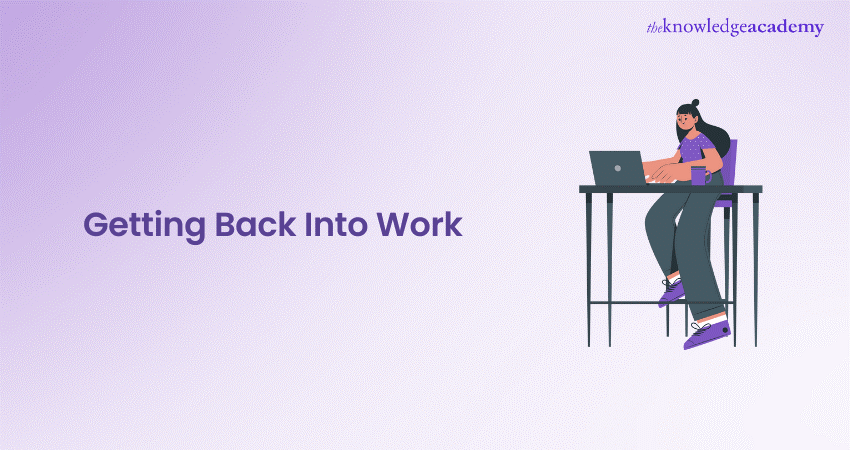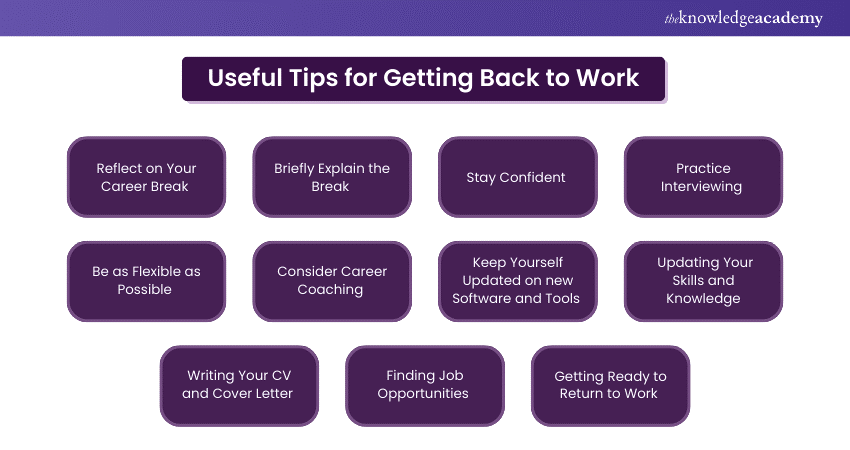We may not have the course you’re looking for. If you enquire or give us a call on + 800 908601 and speak to our training experts, we may still be able to help with your training requirements.
Training Outcomes Within Your Budget!
We ensure quality, budget-alignment, and timely delivery by our expert instructors.

Getting Back Into Work after a career break can feel overwhelming, but it's also an exciting opportunity to start fresh and pursue new targets. Whether you took time off for personal reasons, family, or other commitments, Getting Back Into Work doesn't have to be daunting. With the right approach and a positive mindset, you can step back into the workforce.
This blog provides practical tips and advice to help you navigate this transition smoothly, from updating your skills to finding job opportunities. Let's get started on your journey back to a fulfilling career!
Table of Contents
1) Useful Tips for Getting Back to Work
a) Reflect on Your Career Break
b) Briefly Explain the Break
c) Stay Confident
d) Practice Interviewing
e) Be as Flexible as Possible
f) Consider Career Coaching
g) Keep Yourself Updated on new Software and Tools
h) Updating Your Skills and Knowledge
i) Writing Your CV and Cover Letter
j) Finding Job Opportunities
k) Getting Ready to Return to Work
2) Conclusion
Useful Tips for Getting Back to Work
Here are some practical tips to help you make a smooth transition and confidently re-enter the workforce.

1) Reflect on Your Career Break
Before getting back into job hunting, take some time to reflect on your career break. What were the reasons for your time away? How have you grown or changed during this period? Understanding these aspects can help you frame your break positively and confidently when discussing it with potential employers.
2) Briefly Explain the Break
When updating your CV or during job interviews, be prepared to explain your career break briefly. Keep it concise and focus on any activities you undertook during the break, such as volunteering, freelancing, or taking courses. This demonstrates that you were proactive and continued to develop yourself professionally.
3) Stay Confident
Confidence is key when re-entering the workforce. Believe in your abilities and the value you bring to a potential employer. Remember that many people take breaks for various reasons and successfully return to work. Maintain a positive attitude and reassure yourself that you have the skills and experience to succeed.
4) Practice Interviewing
Interviewing can be nerve-wracking, especially if you haven't done it in a while. Practice your interview skills with friends or family members. Consider common interview questions and how you would respond, particularly those relating to your career break. This preparation can help you feel comfortable and confident during actual interviews.
5) Be as Flexible as Possible
Flexibility can open up more opportunities when you're returning to work. Be open to different types of roles, work arrangements, or even industries. Sometimes, a temporary or part-time position can be a stepping stone to a full-time role. Showing flexibility can make you more attractive to potential employers.
6) Consider Career Coaching
If you're unsure about how to navigate your return to work, consider seeking help from a Career Coach. A professional can provide personalised advice, help you identify your strengths, and guide you through the job search process. They can also help you with interview preparation and CV writing, increasing your chances of success.
7) Keep Yourself Updated on new Software and Tools
The workplace evolves rapidly, and new software and tools are constantly being introduced. Spend some time familiarising yourself with the latest technology and industry trends relevant to your field. Online courses, webinars, and tutorials can be invaluable resources. Being up-to-date shows potential employers that you're proactive and ready to hit the ground running.
Become familiar with the tools for relationship building with our Managing Difficult Conversations Training – Join today!
8) Updating Your Skills and Knowledge
In addition to staying current with technology, consider updating your skills and knowledge more broadly. Take advantage of certifications and workshops to enhance your expertise. This not only boosts your confidence but also makes your CV stand out. Highlighting recent learning experiences can demonstrate your commitment to professional growth.
9) Writing Your CV and Cover Letter
Your CV and cover letter are your first impression of potential employers. Ensure they are up-to-date, well-structured, and tailored to each job application. Emphasise your skills, achievements, and any relevant experience during your career break. Use action verbs and quantify your accomplishments where possible. A strong CV and cover letter can increase your chances of getting an interview.
10) Finding Job Opportunities
Searching for job opportunities can be difficult, but there are many resources available to help. Use online job boards, company websites, and professional networking sites like LinkedIn to find openings. Attend job fairs, industry events, and networking gatherings to meet with employers and other professionals in your field. Networking can often lead to unadvertised job opportunities.
11) Getting Ready to Return to Work
Prepare yourself mentally and practically for returning to work. Ensure you have the necessary documentation, such as updated identification and references. Plan your daily routine to accommodate your new work schedule and consider any logistical aspects such as childcare or commuting. Being organised and ready can help ease the transition and reduce stress.
Learn techniques to boost self-motivation with our Motivation and Goal Setting Training - Join today!
Conclusion
Getting Back to work after a career break can be challenging, but it's entirely achievable with the right approach. Reflect on your break, stay confident, and be proactive in updating your skills and knowledge. Practise interviewing, be flexible in your job search, and consider seeking professional help if needed. With determination and preparation, you can successfully re-enter the workforce and find a role that suits your skills and aspirations.
Learn the techniques to find new job opportunities with our Getting Back Into Work Course – Join today!
Frequently Asked Questions

Yes, networking is crucial for Getting Back Into Work. It helps you connect with potential employers, learn about job opportunities, and get referrals from people in your industry.

Be honest and concise about your career gap, focusing on any constructive activities you undertook, like courses or volunteering. Emphasise how these experiences have made you a better candidate for the job.

The Knowledge Academy takes global learning to new heights, offering over 30,000 online courses across 490+ locations in 220 countries. This expansive reach ensures accessibility and convenience for learners worldwide.
Alongside our diverse Online Course Catalogue, encompassing 17 major categories, we go the extra mile by providing a plethora of free educational Online Resources like News updates, Blogs, videos, webinars, and interview questions. Tailoring learning experiences further, professionals can maximise value with customisable Course Bundles of TKA.

The Knowledge Academy’s Knowledge Pass, a prepaid voucher, adds another layer of flexibility, allowing course bookings over a 12-month period. Join us on a journey where education knows no bounds.

The Knowledge Academy offers various Personal Development Courses, including Getting Back Into Work Course, Motivation and Goal Setting Training, and Managing Difficult Conversations Training. These courses cater to different skill levels, providing comprehensive insights into Behaviour Management.
Our Business Skills Blogs cover a range of topics related to Personal Development, offering valuable resources, best practices, and industry insights. Whether you are a beginner or looking to advance your Personal Development skills, The Knowledge Academy's diverse courses and informative blogs have got you covered.
Upcoming Business Skills Resources Batches & Dates
Date
 Getting Back into Work Course
Getting Back into Work Course
Fri 28th Mar 2025
Fri 23rd May 2025
Fri 4th Jul 2025
Fri 5th Sep 2025
Fri 5th Dec 2025







 Top Rated Course
Top Rated Course



 If you wish to make any changes to your course, please
If you wish to make any changes to your course, please


